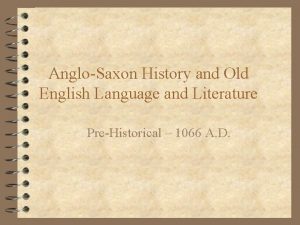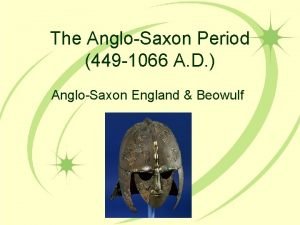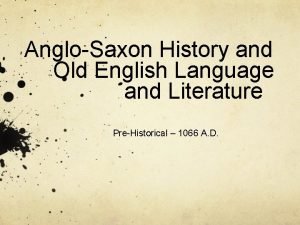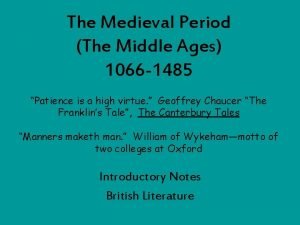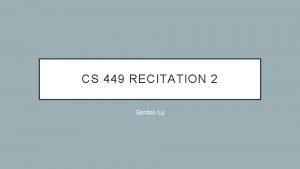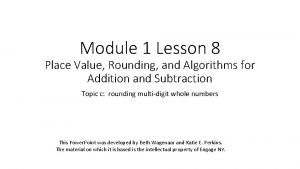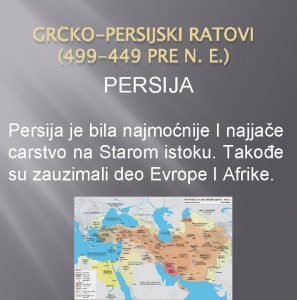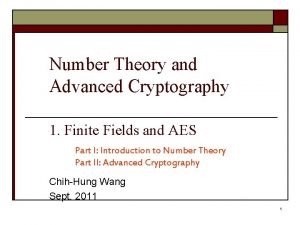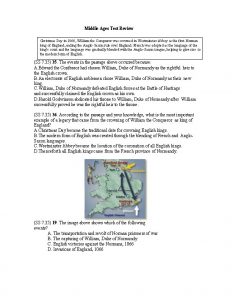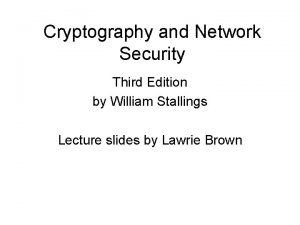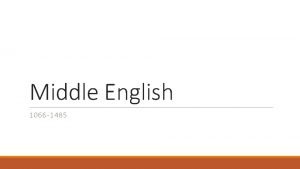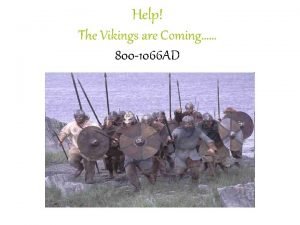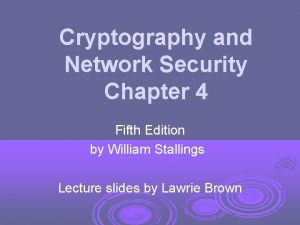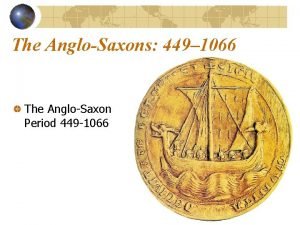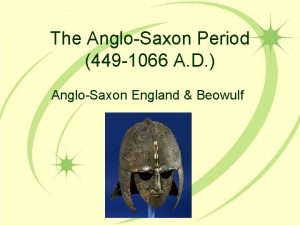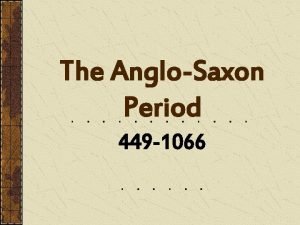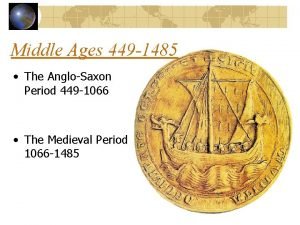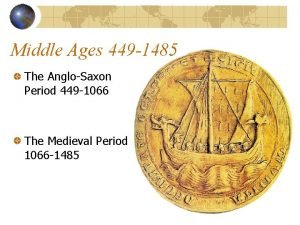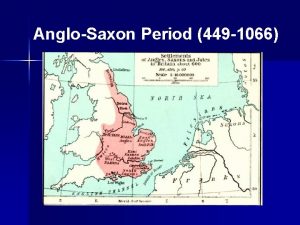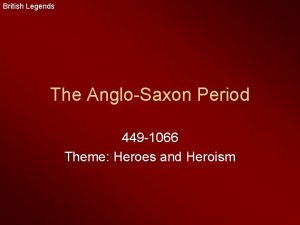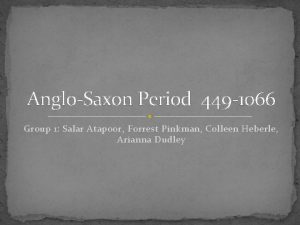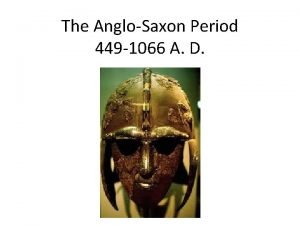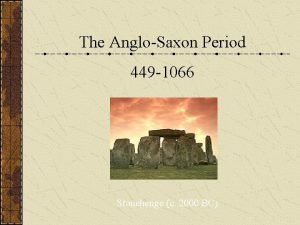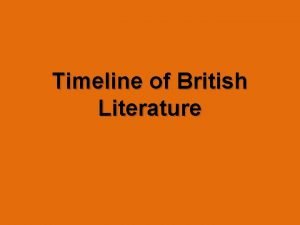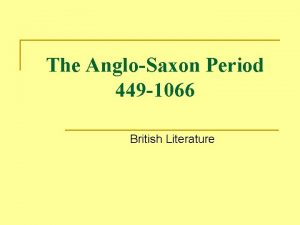The AngloSaxon Period A D 449 1066 Early






















- Slides: 22

The Anglo-Saxon Period A. D. 449 -1066

Early Britain Great Britain has been invaded and settled several times throughout the course of history by the following groups: • the Iberians • the Celts • the Romans • the Angles and the Saxons • the Vikings • the Normans

The Celts (c. 800 -600 B. C. ) § The Celts were farmers and hunters who honored their priestly class: the Druids. § Belief in an “otherworld” or an “afterlife” § Polytheistic – Gods were deities of particular skills – Goddesses were deities of things pertaining to nature

Celts Continued • The Druids • Celtic priests – Teachers, sacrificers, judges, and lore-keepers • Rituals took place in forests • Did not record their learning in writing • Evidence of human sacrifice in Gaul, Ireland, and Britain • Much of what we know about the Celts has been muddied by the period of intermingling with Romans.

The Romans (c. 55 B. C. ) Julius Caesar invaded in 55 B. C and Claudius returned about 100 years later. During the Roman rule, Christianity began to take hold and the old Celtic religion began to vanish. Occupation by the Romans resulted in a central form of government and a military presence.

Roman Contributions The Romans built a network of roads (some still used today) and a great defensive wall, known as Hadrian’s Wall, some seventy-three miles long. Romans introduced cities, roads, and written scholarship

Trouble in Paradise § The Romans evacuated their troops from Britain by A. D. 409 § Left Britain with a system of roads, walls, villas, and great public baths § Britain is left without a centralized government and without a strong army to defend itself.

England without the Romans Without Roman control, Britain was a country of separate clans. The result was weakness Island was ripe for invasions by non. Christian peoples from the Germanic regions of Continental Europe.

The Anglo-Saxons Possible reasons why they came: – their land often flooded and it was difficult to grow crops, so they were looking for new places to settle down and farm. – Some sources say that Saxon warriors were invited to come to England.

Who They Were Anglo Saxon means “war smith”. “Invaded” Britain from the Scandinavian countries The Anglo-Saxons took control of most of Britain Divided the country into kingdoms, each with its own royal family. As the Angles slowly interact with the Celts, their language, Angle-ish (English) begins to blend with the language of the Celts to form Old English.

The Land They Ruled By around 600 A. D. there were five main Anglo. Saxon kingdoms: – Northumbria – Mercia – Wessex – Kent – Anglia

How They Lived § Anglo-Saxon settlements consisted of just two or three families and a few buildings § Life was highly organized in tribal fashion § Ruled by a king chosen by a counsel of elders known as “witon. ” § Most people in Anglo-Saxon society were either freemen or slaves. – Richer freemen were known as 'thanes. '

How They Lived Mead Hall • center of life • sleeping quarters • dining area • meeting place

Structure of Society Chieftain Thane Peasant Serfs Thane Peasant Serfs Comitatus: Thanes are loyal to Chieftains and fight wars for them; in return the Chieftains reward the Thanes and offer protection.

Punishment in Society § The Anglo-Saxons didn't have prisons. People were often punished with fines. § For minor crimes, a nose or a hand might be cut off. § If a person killed someone they had to pay money to the dead person's relatives, or even a life. – This was called a 'wergild. '

Old English § Old English was chiefly an oral language § Anglo-Saxon scribes, however, kept written records in scripts learned from Celtic missionaries. § Viking (Norse) words are used in everyday English (i. e. kick, law, sister, sky, window). § Words concerning religion and learning were borrowed from Latin (i. e. school, candle, altar, paper, circle)

The Most Famous Relic n 7 th century helmet n Reconstructed from hundreds of corroded iron fragments n The bronze eyebrows are inlaid with silver wire and garnets. Each ends in a gilt-bronze boars head. n A gilded dragon-head lies nose to nose with a similar dragonhead placed at the end of the low crest that runs over the cap. The nose, eyebrows and dragon make up a great bird with outstretched wings that flies on the helmet.

The Hereafter § Until Christianity set in, the Anglo-Saxons felt there was nothing after death. Life is hard, and then you die. § When people died they were either cremated and put in a pottery urn or buried with their belongings.

Sutton Hoo • Located in Woodbridge, Suffolk, England; discovered in 1939 • Burial ship of an Anglo-Saxon king • Burial site contained 41 items of solid gold and 37 gold coins, as well everyday items • The ship had been sailed upriver, dragged overland, and then placed in a pit dug at the burial spot. The ship was then covered with a large mound of soil.

So Where Did They Go? In the 8 th and 9 th centuries the Vikings began to come to Britain Anglo-Saxon accounts describe terrible Viking raids – Massacres – churches destroyed, animals and precious objects stolen. By the end of the 870 s, the Vikings occupied most of eastern England.

The Struggle for Land § By 878 the Vikings had conquered all of England except Wessex. § Wessex remained Anglo. Saxon and was ruled by King Alfred of Wessex. § Gradually, the areas of England under Viking rule were re-conquered by Alfred's descendants.

The Beginning of the End § The Anglo-Saxon period came to an end in 1066 § Duke William of Normandy came to England defeated Harold, the Earl of Wessex, in the Battle of Hastings. § This was the beginning of the Norman period in English history, after the Norman Conquest.
 The anglo-saxon period 449 to 1066 answers
The anglo-saxon period 449 to 1066 answers Old english kingdoms
Old english kingdoms Anglo saxon runes
Anglo saxon runes Anglosaxon history
Anglosaxon history Middle english period 1066-1500
Middle english period 1066-1500 Periods in english literature
Periods in english literature Cs 449
Cs 449 Cpsc 449
Cpsc 449 449 019 rounded to the nearest hundred thousand is
449 019 rounded to the nearest hundred thousand is Role of a judge
Role of a judge 499-449
499-449 Cs 449
Cs 449 Jhlt. 2019 oct; 38(10): 1015-1066
Jhlt. 2019 oct; 38(10): 1015-1066 Find multiplicative inverse of 550 in gf(1759)
Find multiplicative inverse of 550 in gf(1759) Ul 1066 vs ul 489
Ul 1066 vs ul 489 Middle ages test review
Middle ages test review 1970 mod 1066
1970 mod 1066 Jhlt. 2019 oct; 38(10): 1015-1066
Jhlt. 2019 oct; 38(10): 1015-1066 The middle ages 1066 to 1485 unit introduction
The middle ages 1066 to 1485 unit introduction 14th october 1066
14th october 1066 The vikings 800 to 1066
The vikings 800 to 1066 Jhlt. 2019 oct; 38(10): 1015-1066
Jhlt. 2019 oct; 38(10): 1015-1066 Gcd of 1970 and 1066
Gcd of 1970 and 1066

